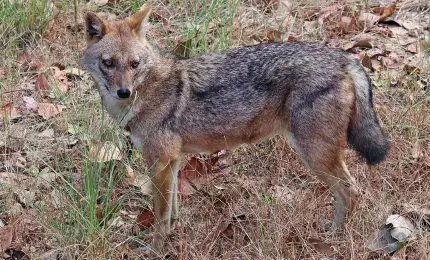
In this article, we’ll dive into the world of the golden jackal. We’ll look at what they eat, how they hunt, and why their diet and strategies matter to their survival. It’s like peeling back the layers of an onion, revealing the complex life of this remarkable animal. So, grab a cup of coffee, and let’s explore the diet and hunting strategies of the golden jackal together!
Understanding the Golden Jackal’s Habitat
Before we jump into the specifics of what golden jackals eat and how they hunt, it’s essential to understand where they live. Golden jackals are found across various regions, from Africa to parts of Asia and Southeastern Europe. They thrive in open grasslands, savannahs, and even rural areas where human activity gives them access to scraps.
These adaptable creatures often make their homes in dens, which they can dig themselves or occupy abandoned burrows of other animals. Their habitats usually offer a mix of open spaces for hunting and areas where they can find food easily. This adaptability is crucial for their survival because it allows them to source food from both natural and human-altered environments.
The Versatile Diet of the Golden Jackal
What do golden jackals eat? Honestly, they’re not picky eaters, which is a significant factor in their survival. Their diet is primarily omnivorous, meaning they eat both plants and animals. You might be surprised to learn that their meals can include:
- Small mammals, like rodents and hares.
- Birds and their eggs.
- Reptiles and amphibians.
- Fruits, roots, and insects.
- Carrion—meaning they’ll scavenge dead animals, too.
This variety means they can adapt their diet based on what’s available and the season. In some areas, they might focus on small mammals during spring and summer, while scavenging more during the fall and winter months when food is scarce.
Hunting Strategies of the Golden Jackal
So, how do golden jackals go about hunting? They have a couple of clever strategies up their furry sleeves. One approach is hunting alone or in pairs, which allows them to be stealthy and use teamwork. When hunting in pairs, they can coordinate movements to chase their prey effectively. Here’s the thing: they rely on their acute sense of hearing and smell to locate food, making them skillful hunters.
Another strategy involves stalking their prey. Imagine yourself quietly sneaking up on someone in a game of hide-and-seek. Golden jackals often use this tactic, slowly approaching their targets while blending into their surroundings. Once they’re close enough, they’ll pounce with surprising speed.
Scavenging Behavior: An Important Survival Skill
Apart from hunting, golden jackals have honed their scavenging skills over time. They often follow larger predators—like lions and hyenas—to snatch leftovers from their kills. This scavenging not only helps them find food but also plays a vital role in the ecosystem by cleaning up carrion.
You might be wondering why scavenging is a smart strategy. Well, it requires less energy than actively hunting and can yield larger meals, especially if they come across a fresh kill. Plus, it allows them to harness their cunning, making the most of what nature provides.
The Role of Pack Behavior
While golden jackals are often seen alone or in pairs, they can also form small packs. This social behavior is instrumental during both hunting and scavenging. When hunting in a group, they can corner and catch larger prey that would be too risky to tackle solo. Working together not only improves their chance of a successful kill, but it also promotes social bonds within the group.
Interestingly, pack dynamics can shift. Sometimes, you’ll find a dominant pair leading the hunt while others serve different roles, like keeping watch or helping to drive prey towards their teammates. This level of cooperation highlights the intelligence of these animals and their ability to adapt to varying circumstances.
Seasonal Variations in Diet and Hunting
Like many animals, the golden jackal’s diet and hunting strategies can change with the seasons. In spring and summer, they tend to focus on small mammals and birds, taking advantage of the abundance of young animals. You might even catch them raiding nests for eggs during this time!
As the weather cools, their reliance on scavenging increases. They might turn to fruits and vegetation when prey is harder to find. This adaptability is key—being able to shift their diet based on what’s available helps them survive seasonal changes.
The Economic Importance of Golden Jackals
You might not have considered this, but golden jackals can have a surprisingly positive impact on local economies. In many regions, they help control rodent populations by preying on these small mammals. This, in turn, supports agriculture by protecting crops from pests. Their scavenging habits also play a vital role in waste management, keeping the ecosystem healthy.
However, it’s essential to strike a balance. In areas where golden jackals may come into conflict with livestock owners, measures are needed to ensure both the animals and farmers can coexist peacefully.
Conservation Efforts and Challenges
Unfortunately, like many wildlife species, golden jackals face challenges. Habitat loss and human-wildlife conflict are significant threats. Conservation efforts are crucial to protect these animals and their ecosystems. Organizations work toward understanding their role in the environment, promoting cohabitation with humans, and ensuring their populations remain stable.
You might wonder, “What can I do?” Supporting local wildlife conservation initiatives or simply spreading awareness about the importance of these clever creatures can make a difference. The future of golden jackals depends on our efforts to appreciate and protect their lifestyle.
In conclusion, the golden jackal is a remarkable survivor, showcasing the incredible adaptability of nature. Their diet and hunting strategies are essential for not only their survival but also the health of their ecosystems. By understanding these clever creatures, we can appreciate the role they play in the natural world, and hopefully, contribute to their continued existence.
